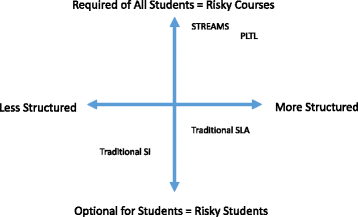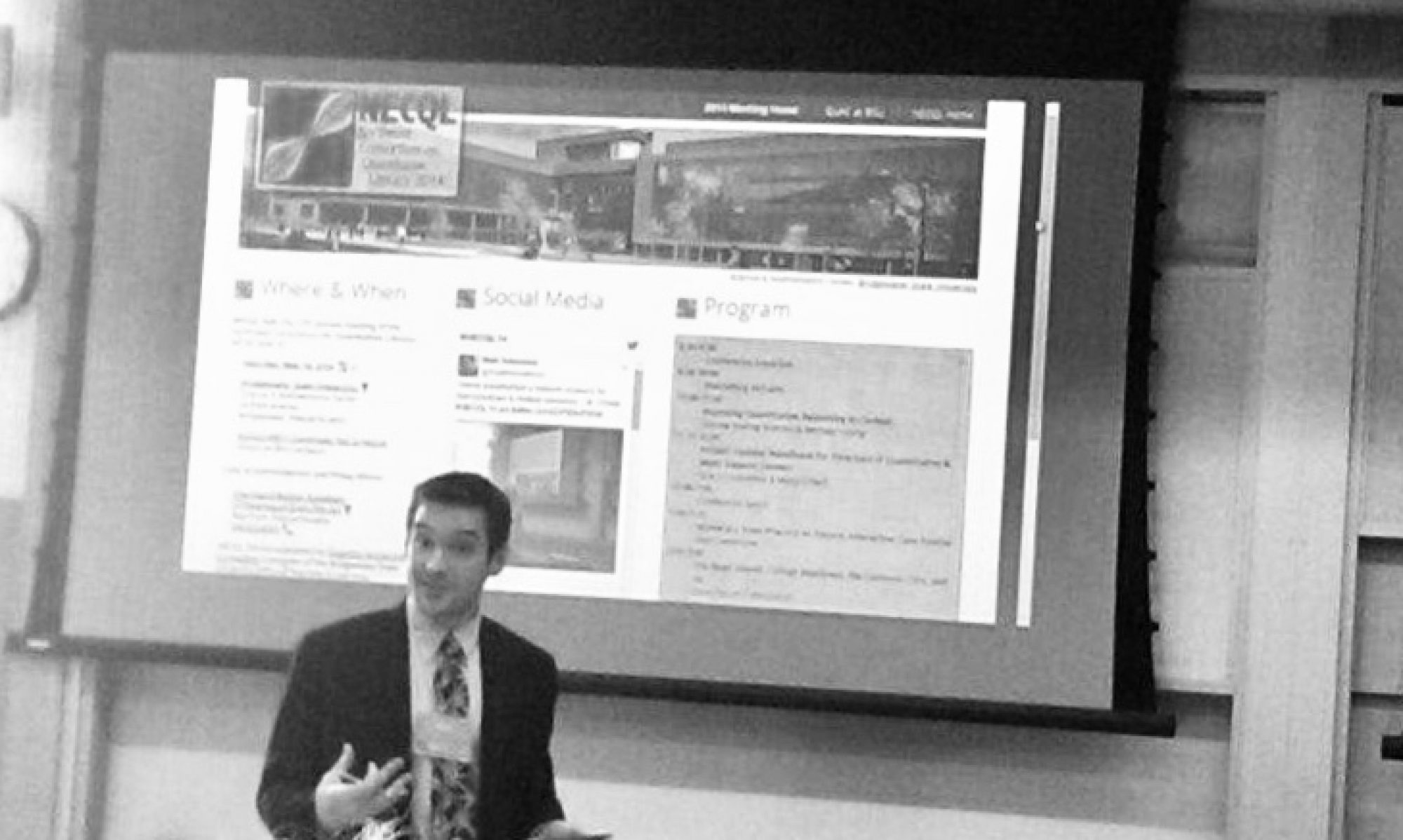For majors in mathematics and the sciences, success in their college degree plans is particularly impacted by their experiences in their first year. STEM majors who have a negative first contact with required STEM courses are at disproportionate risk of abandoning their major — or abandoning college altogether. So a little assistance in that first year goes a long way toward keeping students on track to successful completion of their degree. Supplemental instruction, and peer-cooperative learning programs like it, have proven to be an effective form of such assistance.
What is Supplemental Instruction?
Supplemental instruction (SI) is one among a spectrum of peer-cooperative learning programs in higher education. These programs connect introductory students with more advanced peers in their disciplines, who engage them in activities that support their success in the course.
Peer-cooperative learning programs exist on a spectrum of, on one hand, how carefully their structure is aligned with the structure of the course they support; and on the other hand, the extent to which students are required to engage with those supports. On one end of this spectrum is one-on-one, elective tutoring: merely reactive to individual student need so not structured to align with any course, and student participation is totally optional under most circumstances. On the other end are integrative programs like peer-led team learning (PLTL), a highly structured, small-group problem-solving experience that serves as a required weekly adjunct to a course.

Reviews and meta-analyses typically show that the more highly structured and less optional a program is, the larger the impact on student success. The trade-off, of course, is the investment of time, funding, and leadership required to implement the more extensive programs. Institutional realities such as scheduling, registration and financial aid, nonresident student populations, scarce funding and SI leader recruitment pools, and campus cultures and beliefs around learning improvement can all make growth toward integrative programs slow, and incremental approaches attractive.
Supplemental instruction (SI), as originally practiced at the University of Missouri-Kansas City, can be seen as an evolutionary stage beyond one-on-one tutoring. It generally describes supplemental workshops offered on an elective basis — most students are not required to attend — but which are programmed throughout the semester with curriculum that complements in a timely fashion the learning outcomes of the courses they support.
David Arendale (U. Minnesota) has compiled the most extensive annotated bibliography of peer-cooperative learning programs I have seen, that showcases the full range of programs of this type in higher education.
What Do SI Programs Do?
As practiced by its originators at UMKC, SI draws on several key factors for its effectiveness.
- Set clear goals, priorities, and student incentives to maximize access and impact
- SI identifies and supports courses that are risky, not students that are risky. Strategic direction from institution should ensure SI support is directed to where it is most aligned with campus priorities.
- Typical goals: improve grades / success rates in linchpin courses; improve persistence, retention, graduation rates for supported students.
- Strategically design SI programming for maximal student participation. (Mandatory is best, highly incentivized by faculty members is good. Fully optional programs are generally ineffective due to self-selection.)
- Recruit, train, and provide ongoing professional development for SI leaders, in partnership with faculty
- Establish clear lines of responsibility and oversight, and well-publicized job descriptions and recruitment/hiring timetables.
- Support faculty in designing and aligning SI workshop content
- Ensure students receive support with key skills when they are most vital for success. (Example: Just-In-Time Teaching model)
- Work with academic departments to establish common SI curricula across sections and instructors.
- Provide SI leaders with feedback to help them improve their practice
- Regular practice of formative feedback, e.g. in communities of practice that involve instructors and SI program staff
- Regular practice of evaluation that includes feedback from students who participate, and which informs personnel decisions for SI leaders
- Use data to inform program effectiveness and advocate for its sustained value
- Assess key indicators of course success and retention for SI participants vs. non-participants in same semester of course, and supported course sections vs. unsupported sections with same instructor in previous years
- Increases in student retention and completion can become self-funding
What Do Faculty and SI Leaders Need?
Supporting faculty members to map their course curriculum and sequence SI supports over the semester is a crucial first step in designing for student success. Then, SI leaders should be equipped with this information; empowered to design active, engaged workshop activities to complement the faculty’s instruction; and supported in sustaining an ongoing conversation with faculty to support them in adapting their teaching approaches to the needs of their students.
These presentations were used with faculty and SI leaders in training at Cape Cod Community College during the summer of 2018:
- Mapping a Path Through the Gateway Courses: Faculty Curriculum Map Training, July, 2018
- Leading for Success: SI Leader Training, August 27, 2018
If I could give SI leaders just one small tip to improve their work, it’d be this advice on questioning. How you invite students’ questions makes all the difference! Check out the thread on Twitter:
Two years ago, I was saying “do you have any questions?”. Last year I switched to “what questions do you have?” It made a difference. Today I tried “ask me two questions”. And they did! And those ?s led to more ?s. It amazes me that the littlest things have such a big impact!
— Andre Sasser (@MrsSasser) August 27, 2018
Peer-Cooperative Learning at Bridgewater State University
Bridgewater State University implemented a required peer-cooperative learning program across all its gateway mathematics and science courses in 2009 under a STEM talent expansion program (STEP) grant from the National Science Foundation. This program contributed to drastic improvements in gateway course success and student retention in STEM majors at the institution, as described in the following articles.
- Salomone, M. & Kling, T. (2017) Required Peer-Cooperative Learning Improves Retention of STEM Majors, International Journal of STEM Education, 4:19, DOI: 10.1186/s40594-017-0082-3
